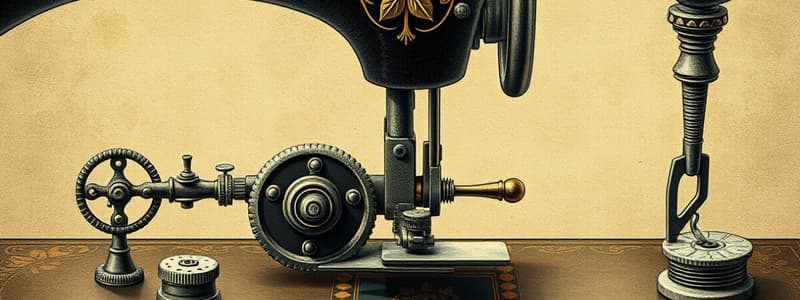Podcast
Questions and Answers
What is the function of the handwheel?
What is the function of the handwheel?
- Holds thread in place
- Selects stitch patterns
- Regulates stitch length
- Turns the needle up and down (correct)
What is the purpose of the slide plate?
What is the purpose of the slide plate?
To access the bobbin case.
The ___ dial is used to select the type of stitch needed.
The ___ dial is used to select the type of stitch needed.
pattern selector
The foot pedal turns the sewing machine off and on.
The foot pedal turns the sewing machine off and on.
Where is the power switch located on the sewing machine?
Where is the power switch located on the sewing machine?
What do feed dogs do?
What do feed dogs do?
What is the function of the presser foot lifter?
What is the function of the presser foot lifter?
The ___ holds thread spools in place at the top of the sewing machine.
The ___ holds thread spools in place at the top of the sewing machine.
The presser foot applies pressure to hold the fabric in place.
The presser foot applies pressure to hold the fabric in place.
What does the stitch length control dial do?
What does the stitch length control dial do?
What is a bobbin?
What is a bobbin?
What does the spool thread refer to?
What does the spool thread refer to?
What is the purpose of the bobbin winder?
What is the purpose of the bobbin winder?
What is the function of the take-up lever?
What is the function of the take-up lever?
Flashcards are hidden until you start studying
Study Notes
Sewing Machine Parts and Functions
-
Handwheel: Allows manual control of the needle movement; primarily used for raising and lowering the needle gradually.
-
Slide Plate: A removable plastic cover that provides access to the bobbin case for placing or removing the bobbin.
-
Pattern Selector: A dial that enables the user to choose different stitch types or patterns, facilitating various sewing styles.
-
Foot Pedal: Controls the machine's operation by regulating speed, starting, and stopping based on the pressure applied; operated with the foot.
-
Power Switch: Located on the machine's right side; turns the machine on or off, with an indicator light for operation status.
-
Feed Dogs: Mechanical components that help maintain stitch length and move the fabric under the presser foot during sewing.
-
Presser Foot Lifter: A lever used to elevate or lower the presser foot, enabling the insertion of fabric and facilitating sewing.
-
Spool Pin: Positioned at the machine's top to secure the thread spools; crucial for ensuring even threading through the sewing mechanism.
-
Presser Foot: Applies pressure on the fabric to hold it in place while the feed dogs advance it beneath the needle.
-
Stitch Length: A dial that adjusts how long each stitch is, allowing for customization based on sewing needs.
-
Bobbin: A small, flat spool that contains the machine's bottom thread, essential for forming stitches on fabric.
-
Needle: The sharp component responsible for piercing the fabric and interlocking threads to create stitches.
-
Spool Thread: The top thread used in sewing; must be properly placed on the spool pin to ensure smooth operation.
-
Bobbin Winder: A device that facilitates winding thread onto a bobbin, ensuring an organized supply of thread during sewing.
-
Take-up Lever: A vital part of the thread system, located above the presser foot; it helps control the tension and movement of the thread during stitching.
Studying That Suits You
Use AI to generate personalized quizzes and flashcards to suit your learning preferences.




